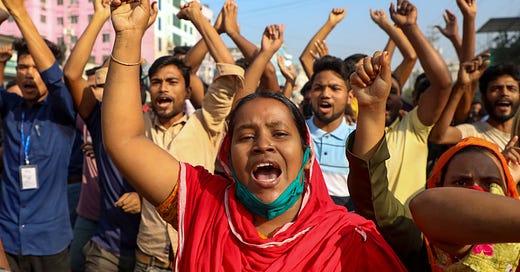Garment Workers in Bangladesh Mobilize
Workers in Bangladesh Protest for Wages Withheld Due to National Shutdown
Hundreds of garment factory workers in Bangladesh have been boycotting work and staging protests for the past two weeks, demanding timely payment of wages, better incentives, and an end to arbitrary layoffs.
The workers are calling for an increase in attendance bonuses and tiffin (meal) allowances, as well as an end to random layoffs and wage discrimination between different groups of workers and in the recruitment of male and female employees. Attendance bonuses, paid by factory owners, serve as an incentive for regular attendance.
At several factories, workers are also protesting delays in last month’s wages. Some factory owners have withheld payments, citing the “no work, no pay” policy. Many factories were closed for most of the previous month due to the protests against the Sheikh Hasina government, curfews, and an absence of implementation of law and order.
Former Prime Minister Sheikh Hasina left the country last month, and an interim government, led by Nobel laureate Muhammad Yunus, has taken over. This interim administration includes representatives from groups that protested against Hasina’s administration.
According to Prothom Alo, a leading Bangla newspaper, over 100 factories have been affected by workers’ actions since the end of August. Workers at several factories have gone on strike, while others have resorted to blocking highways in support of their demands.
After days of agitation, some factory owners have promised to pay the August wages this week. However, a large number of workers had not received their pay by Tuesday evening, sparking violent protests in several factories.
The government has since deployed army and paramilitary forces in the industrial zones.
On Tuesday, the Bangladesh Garment Manufacturers and Exporters Association (BGMEA) announced an increase in the attendance bonus by 225 Taka (USD 1.88) per month and agreed to end discrimination in hiring. However, workers at around three dozen factories have refused to resume work, stating that their key demands have not yet been met.
Shutting down factories to pressurize workers
Instead of addressing the workers’ demands, many factory owners have decided to shut their factories in the Savar-Ashulia and Gazipur industrial areas near the capital, Dhaka, for an indefinite period.
On Wednesday, more factory owners declared holidays and closed their operations, describing the workers’ demands as “illegal and unjust.”
Labor unions have claimed that the factory closures are a tactic to pressure workers to return to the workplace. The labor law states that employees will not be paid for the days factories are closed, as reported by The Daily Star. Similarly, the Dhaka Tribune said that under Section 13(1) of the Bangladesh Labor Act of 2006, no worker will be paid for days when a factory is shut in response to an “illegal strike, protests, and vandalism.”
Sharif Shamsir of the Workers Party of Bangladesh (WPB) told Peoples Dispatch that the current agitation in the Savar-Ashulia and Gazipur industrial belt appears spontaneous, reflecting workers’ growing desperation in light of the rising cost of living in the country.
Many of the trade unions that were advocating for higher wages before the regime change have become inactive due to fears of political persecution. The interim government has arrested several prominent leftist leaders, including WPB President Rashed Khan Menon and the left-wing party Jatiya Samajtantrik Dal-Jasod President, Hasanul Haq Inu.
So far, the interim government has not intervened in resolving the workers’ issues. Sharif Shamsir notes that the government’s failure to act may only intensify the workers’ agitation.




